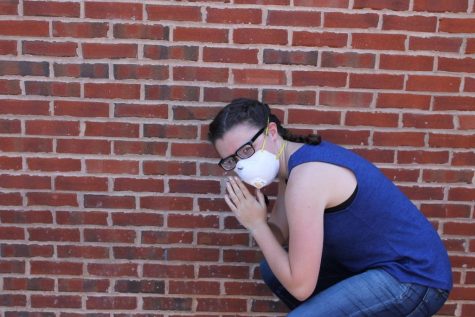Clearing the air on air quality

Photo Credit: Ann Butler
At a tense Board of Education meeting in November, the board heard the concerns of several teachers and parents.
January 17, 2017
In two different air quality tests, potentially hazardous chemicals were found in several rooms around the High School, raising questions from parents and students about its safety. Recent consensus suggests that the problem is less harmful than initially feared.
These points of issue were found in published reports from air quality tests performed by McCabe Environmental Services in August and September. Upon the release of these documents on the district website, parents and students expressed their confusion to the district administration regarding the several times the results breached the stated standards for testing. Among such chemicals were benzene and 1,2,4 trimethylbenzene.
“I have that same question as the parents,” Sheldon Hirschberg, the president of the Board of Education, said in November. “What does all that mean?”
Trimethylbenzenes are “an irritant in high levels… In the hundreds and up parts-per-million (ppm)” according to Gregory Babunovic, a chemistry graduate student at Harvard. “To contrast, the levels found in Glen Rock High School are at all way less than 1 ppm (converted from the ug/m3 values they give) – so at least 100x lower than any irritant effect.”
In high concentrations, benzene has been linked to leukemia. This fact raised health concerns among concerned faculty members.
Benzene is “something that in extremely high concentrations may be problematic, but in the levels that we found in these reports, there’s no concern whatsoever,” Michael Rinderknecht, the district business manager, said.
Reassurances from both the scientific community and administration have alleviated much concern, particularly since these chemicals are not frequently found library settings. Babunovic says that he would expect to find them in areas that see a lot of car exhaust.
“Trimethylbenzenes appear to be regular additives to fuel and solvent mixtures. This means that they’re in the gas you put in your car, in high levels,” Babunovic said. “Increased levels of 1,2,4 trimethylbenzene could be from road pollution.”
As the media center is located next to a parking lot, McCabe Environmental has suggested that the two may be correlated.
Trimethylbenzenes “have not been linked to cancer, even in the 1000s of ppm,” Babunovic said. “Places where exposure is likely to be much higher, like gas stations, and people who are regularly exposed to trimethylbenzenes, like gas station employees, show few, if any, adverse effects.”
Rinderkinecht said that a number of misunderstandings and false information led to the widespread concerns.
“I think a lot of misinformation got out there that got that snowball rolling and it just got bigger and bigger,” he said.
Despite this information, many continue to point to the World Health Organization benzene standards of 0.17 μg/m3, a limit below the recorded 1.0 μg/m3 in classroom D-212 on Sept. 16.
“I am concerned, and, of course, those parents are concerned because their children attend those schools,” Hirshberg said. “My children went through the Glen Rock school system, and if they were there, I would have concerns. I think they want answers, just like how the Board of Education wants answers.”
Rinderknecht explained that the standards the Board of Education follows in cases like this are set by the New Jersey Department of Environmental Protection (NJDEP), and the unclear standards that had raised questions from parents were because New Jersey refers testing agencies to different standards, from the NJDEP to the United States Environmental Protection Agency (USEPA).
Referencing the written portions of the McCabe reports, Babunovic said, “The EPA limit is, overall, unjustified given the science that’s out there. I would go so far as to call it complete and total bull . McCabe hints at the same conclusion.”
Nevertheless, the concerns harbored by some of community will be addressed if found to be factual.
“If it is proven that there is a problem, in my personal opinion, and I can’t speak for the board, I would absolutely remediate that problem,” Hirschberg said.



